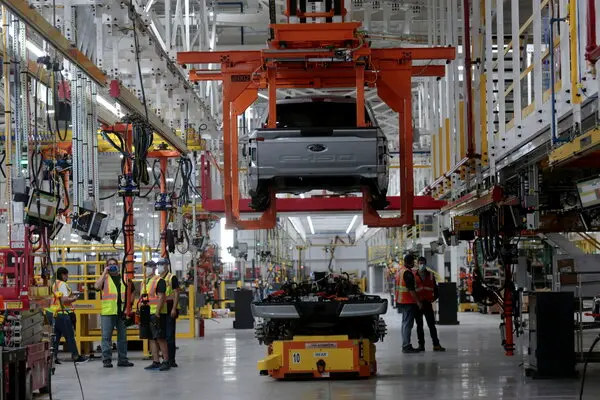Ford Motor Co. has halted construction on a planned electric vehicle battery plant in Michigan, a project that Republicans have criticized because the company plans to use licensed Chinese battery technology.
The automaker said it is pausing work on the facility “until we’re confident about our ability to competitively operate the plant.” The company did not provide a specific timeline for when construction would resume.
The halt in construction comes as Ford is facing a number of challenges, including the ongoing UAW strike and supply chain disruptions. The company is also under pressure to ramp up its electric vehicle production in order to compete with Tesla and other rivals.
Ford had expected the planned battery plant to create 2,500 jobs in Michigan. Ford has said it is committed to keeping the plant in the state, but it is unclear when construction will resume.
The Republican opposition to the plant is based on concerns about China’s growing influence in the US economy. Republicans have accused Ford of selling out American jobs to China.
Ford has defended its decision to use Chinese battery technology, saying that it is necessary to stay competitive in the global electric vehicle market. The company has said that it will own and operate the plant and that CATL’s involvement will be strictly as a licensor of battery cell technology.
The halt in construction on the battery plant is a setback for Ford’s plans to expand its electric vehicle production. It is also a blow to the state of Michigan, which is hoping to become a hub for the electric vehicle industry.
Implications of the halt in construction
The halt in construction on the Ford battery plant has a number of implications for the company, the US economy, and the future of electric vehicles.
For Ford, the halt in construction is a setback for its plans to expand its electric vehicle production. The company is facing increasing pressure from competitors like Tesla to ramp up production of EVs. The halt in construction could delay Ford’s ability to bring new EVs to market.
For the US economy, the halt in construction is a missed opportunity to create jobs and boost economic growth. The plant was expected to create 2,500 jobs in Michigan. The halt in construction also raises concerns about the US’s ability to compete with China in the electric vehicle market.
For the future of electric vehicles, the halt in construction is a reminder of the challenges that the industry faces. The EV industry is still in its early stages of development and there are a number of obstacles to overcome, such as supply chain disruptions and the high cost of batteries.
Conclusion
The halt in construction on the Ford battery plant is a developing story with important implications for the company, the US economy, and the future of electric vehicles. We still need to see when construction will resume and what the long-term impact of the halt will be.









